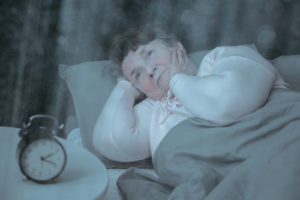 If you’ve ever suffered from insomnia, you know the dreadful feeling of rolling around in your bed during the night, not being able to catch even an hour of sleep. Insomnia is not an age-related issue; it could happen to us at any point in life. It’s estimated that between 30 and 50% of U.S. citizens suffer from insomnia at one point in life.
If you’ve ever suffered from insomnia, you know the dreadful feeling of rolling around in your bed during the night, not being able to catch even an hour of sleep. Insomnia is not an age-related issue; it could happen to us at any point in life. It’s estimated that between 30 and 50% of U.S. citizens suffer from insomnia at one point in life.
However, Beverly Hills home care experts are reporting that many elderly citizens they are helping by providing in-home care services are complaining about not being able to fall asleep. Insomnia is particularly problematic for seniors because the fatigue resulting from not catching any sleep can make their existing medical conditions worse.
In this article, we’ll talk about senior citizens suffering from insomnia, what causes it and most importantly, how to prevent it.
What Causes Insomnia in Seniors?
There’s a widely popular belief that we require less sleep after we turn 50 than we do when we’re younger. However, this statement is completely untrue. And while latest research claims there’s no such thing as ideal sleep length, adults generally need between 7 and 9 hours of quality sleep every night to feel rejuvenated. That said, seniors can find it particularly difficult to get enough sleep to feel rested.
Some medical conditions such as respiratory diseases or intestinal issues can cause Insomnia as a side-effect. Likewise, some medication seniors often take may contain ingredients that can make falling to sleep extremely difficult.
Apart from that, the circadian rhythm in seniors can change and seniors might find themselves feeling tired earlier. As a result, they tend to go to bed earlier, but get up too early as well.
Another common cause of insomnia in seniors is depression. These two conditions are often a dangerous couple. That’s why you have to check if your senior might be suffering from depression before treating insomnia.
How Can Insomnia Affect Seniors?
As we’ve mentioned, losing sleep over long periods of time can accumulate and lead to a series of health issues or make existing issues even worse. The lack of sleep affects how our body heals and recovers and can affect both the seniors’ physical and mental health.
If left untreated, insomnia can affect the cardiovascular health, as the body does not get enough rest to repair the heart or the blood vessels. As a result, insomniacs are often at risk of high blood pressure, heart disease and more serious health issues like a stroke.
Another issue seniors suffering from insomnia often face is decreased cognitive performance and memory loss. These two issues are already affecting many seniors, but insomnia can make matters even worse. Seniors suffering from insomnia may have more trouble remembering, learning or making fast decisions.
Finally, insomnia could lead to hormonal and insulin misbalance, which could lead to increased appetite and weight gain. More concerning, insomnia is also known to cause diabetes in seniors. Since sleep is vital to our metabolism, losing sleep can have serious consequences.
How to Treat Insomnia in Seniors?
However, you’ll be relieved to hear insomnia is a condition that can be treated. In most cases, the treatment is a success. However, your senior loved one will have to make some changes in their behavior.
How to treat insomnia in seniors without medication:
- Going to sleep and waking up at the same time
- Not drinking any fluids three hours before bedtime
- Avoiding caffeine in the afternoon (or completely if possible)
- Limiting sugar consumption before sleep
- Limiting how much you eat before sleep
- Removing any light sources in the bedroom
- Trying to minimize the noise in the bedroom
- Exercising during the day
- Practicing Yoga before sleep
- Keeping pets and grandchildren away from the bedroom during the night
If these tips don’t help, you should have a doctor examine your senior loved one and recommend an effective treatment. The treatment could range from massages to prescription pills. However, they should be used only as the last resort. The doctor could also show seniors useful relaxation exercises or recommend cognitive behavioral therapy.
With a little help from you, the doctor and a caregiver, your senior loved one will be able to get quality sleep and live a healthier, happier life.








